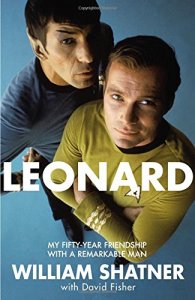Star Trek: Review: Leonard
By William Shatner with David Fisher Thomas Dunne Books (US), Sidgwick & Jackson (UK), out now Star Trek fans worldwide grieved when Leonard Nimoy voyaged to the final frontier on […]
By William Shatner with David Fisher Thomas Dunne Books (US), Sidgwick & Jackson (UK), out now Star Trek fans worldwide grieved when Leonard Nimoy voyaged to the final frontier on […]

 By William Shatner with David Fisher
By William Shatner with David Fisher
Thomas Dunne Books (US), Sidgwick & Jackson (UK), out now
Star Trek fans worldwide grieved when Leonard Nimoy voyaged to the final frontier on 27 February, 2015, aged 83. But while most mourned Mr. Spock and the talents of the actor who brought the half-Vulcan science officer to such interesting life, a select few mourned the man behind the pointed ears and the nerve pinch – Shatner among them. After all, over the past five decades, Shatner was in a unique position to befriend Nimoy – something which gradually happened despite an initially bumpy ride together on the starship Enterprise…
Leonard is a fairly straightforward book about a complicated man. OK – make that two complicated men, because Shatner (or is it his co-writer David Fisher?) cannot help making comparisons between the two actors’ similar childhood upbringings, similar work habits, differing acting styles and vastly different personalities. Most of the time this works, but when it doesn’t, one cannot help feeling that Shatner simply cannot help making this as much about himself as he can.
That being said, a lot of the book is genuinely affecting, particularly when Shatner lowers his shields and shares such private moments as the many times Nimoy – himself a functioning alcoholic for over twenty years – offered his support and counsel to Shatner’s now-deceased wife Nerine; Nimoy’s strained relationships with his parents (who never understood his decision to become an actor) and his son Adam (which Nimoy was able to repair before his passing); and Shatner’s seemingly genuine bewilderment and sadness that they were largely estranged for the last two years of Nimoy’s life.
Longtime Trekkers will be familiar (perhaps overly so) with many of the anecdotes offered up herein, such as practical jokes involving Nimoy’s bicycle – “the details fade over time”, Shatner admits – and the book is not without flaws. For example, several factual Star Trek errors creep into the proceedings; anecdotes are occasionally repeated; some events are told out of chronological order; and Shatner and Fisher’s writing styles don’t always mesh. But at least Shatner finally seems able to cast a more critical eye on his efforts and actions than in the past.
Verdict: While certainly not the definitive Nimoy biography, Leonard offers an intimate, occasionally touching, portrait of a man of many passions behind the stoic veneer, a man whom Shatner was proud to call his friend. 7/10
John S. Hall